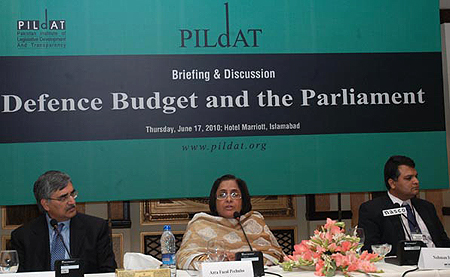|
|
| |
| EVENTS |
|
|
> Greater detail of Defence Budget to improve Civil Military Relations in Pakistan
|
| |
|
PILDAT Briefing Session
June 17, 2010
Islamabad
|
|
| |
Islamabad, June 17; At a PILDAT Briefing on Defence Budget and the Parliament, Chairperson of National Assembly Standing Committee on Defence, Members of Parliament from major political parties, defence and budgetary experts and media analysts demanded that greater details of defence budget need to be made available to the Parliament which will serve to strengthen and improve civil military relations in Pakistan. |
|
| |
In Pakistan�s peculiar civil-military relations, the shrouding of defence budgets in mystery promotes the feeling that Parliament and democracy are not in control. There is an impression that greater Parliamentary oversight may translate into an adversarial relationship but the case of many countries, including India proves that involvement of Parliament creates better ownership and cohesion of a national security perspective, believed Parliamentarians and experts.
|
|
| |
Analysts such as Mr. Riaz Khokhar, Lt. Gen. (Retd.) Talat Masood and Dr. Gulfaraz Ahmad who participated in the discussion alongside elected representatives, believed that Parliament required to develop a better understanding of the defence details and provide policy input on a comprehensive national security policy plan. The Us versus Them approach of the defence sector should not continue and the Parliament�s relationship with the Defence does not have to and will not necessarily be adversarial. For a comprehensive security plan, an ownership of country�s defence and security has to be there by the Parliament and the people. Militaries alone can not guarantee security without the support of the country, its public and public representatives. Not all details of defence budgets are presented everywhere including in India where details are not completely shared with Parliament but in Pakistan, committee and Parliament should be taken into confidence through in-camera briefings. |
|
| |
The democratic government must concentrate on consolidating democracy and Parliamentarians must make a serious, concerted and mature effort to understand policy perspectives and offer serious input scrutiny and oversight and every department of the state will be willing to share details, commented experts. Parliamentary committees need to employ technical expertise, focus on knowing their subjects and take confidence-building measures. Once Parliament performs, it can command confidence. |
|
| |
What are the details of the defence budget of Pakistan in 2010-2011 and how should the Parliamentary Committees on Defence review the defence budget was explained in great detail and clarity by Mr. Nohman Ishtiak, a technical expert attached with the Ministry of Finance. Dr. Azra Fazal Pechuho, MNA, Chairperson National Assembly Standing Committee on Defence chaired the PILDAT briefing. Mr. Ishtiak presented a comparative perspective on details of the defence budgets made public by India and South Africa which highlighted the lack of details presented in Pakistan. |
|
| |
Introducing the topic, Mr. Ahmed Bilal Mehboob, Executive Director of PILDAT said that one of the key powers of the Parliament is the power over national purse strings. A major part of oversight role of any Parliamentary Committees is to review departmental budgets and demands for grants. Without an understanding of the relationship between goals and objectives, budgets and spendings of a Ministry, a Committee is unable to do justice to its role of effective oversight. The same is true of Parliamentary oversight of the defence sector, which essentially is the responsibility of the Parliamentary Committees on Defence in Pakistan. PILDAT believe that the defence budget and its required details, short of those that may jeopardize the national security, should be presented in the Parliament. While we commend current government�s initiative of presenting the details of the Defence Budget to Pakistan�s Parliament, we feel greater details of the defence budget need to be brought before the Parliament. |
|
| |
PILDAT has been working to promote improved civil-military relations in Pakistan and believes that greater Parliamentary control on defence as well as other areas will help to improve civil-military relations. PILDAT�s published work for the benefit of Parliament includes papers such as How to Review Defence Budget in Pakistanand How to Review the Defence Budget (the case of Indian Parliamentary Committee on Defence) while other publications in the field of Civil-Military Relations and improving Parliamentary Oversight of Defence Sector in Pakistan include case studies from countries such as India, Turkey, Indonesia, Turkey and United Kingdom, etc., in addition to various related issues in Pakistan. |
|
| |
|
|
| |
|
|
| |
|
|
| |

|
|
|
|
|
|
|
|
|